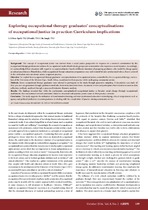| dc.contributor.author | Hess-April, Lucia | |
| dc.contributor.author | Smith, Juliana | |
| dc.contributor.author | De Jongh, Jo-Celene | |
| dc.date.accessioned | 2018-05-15T07:45:31Z | |
| dc.date.available | 2018-05-15T07:45:31Z | |
| dc.date.issued | 2016 | |
| dc.identifier.citation | Hess-April, L. et al. (2016). Exploring occupational therapy graduates’ conceptualisations of occupational justice in practice: Curriculum implications. African Journal of Health Professions Education, 8(2): 189-192. | en_US |
| dc.identifier.issn | 2078-5127 | |
| dc.identifier.uri | http://dx.doi.org/10.7196/AJHPE.2016.v8i2.609 | |
| dc.identifier.uri | http://hdl.handle.net/10566/3666 | |
| dc.description.abstract | BACKGROUND. The concept of occupational justice was derived from a social justice perspective in response to a renewed commitment by the
occupational therapy profession to address the occupational needs of individuals, groups and communities who experience social injustice. Accordingly,
it is acknowledged that education with regard to occupational justice has the deliberate intention of preparing graduates, who would be change agents
as critical practitioners. Nonetheless, while occupational therapy education programmes may seek to instil broader professional values, theory covered
in the curriculum may not always assure congruent practice.
OBJECTIVE. To explore how occupational therapy graduates’ conceptualisations of occupational justice, as instilled by the occupational therapy curriculum
of the University of the Western Cape, South Africa, manifested in their practice while undergoing community service.
METHODS. Seven occupational therapy graduates were selected to participate in the study through purposive sampling. A descriptive case study of
their practice was generated through qualitative methods. Semi-structured interviews, document review and participant observation were used as data
collection methods, analysed through a process of inductive thematic analysis.
RESULTS. The findings revealed that while the participants conceptualised occupational justice as broader social change through occupational
enablement, they encountered several constraints related to structural and systemic power issues in their practice contexts.
CONCLUSION. The study supports the utilisation of transformative learning and inter-professional education in developing critical competencies such as
agency and political proficiency to assist graduates in dealing with the complexities of practice during community service. | en_US |
| dc.language.iso | en | en_US |
| dc.publisher | Health and Medical Publishing Group | en_US |
| dc.rights | This open-access article is distributed under
Creative Commons licence CC-BY-NC 4.0. | |
| dc.subject | Occupational justice | en_US |
| dc.subject | Social justice | en_US |
| dc.subject | Occupational therapy profession | en_US |
| dc.subject | Graduate preparedness | en_US |
| dc.subject | Graduate attributes | |
| dc.title | Exploring occupational therapy graduates’ conceptualisations of occupational justice in practice: Curriculum implications | en_US |
| dc.type | Article | en_US |
| dc.privacy.showsubmitter | FALSE | |
| dc.status.ispeerreviewed | TRUE | |
| dc.description.accreditation | DHET | |

